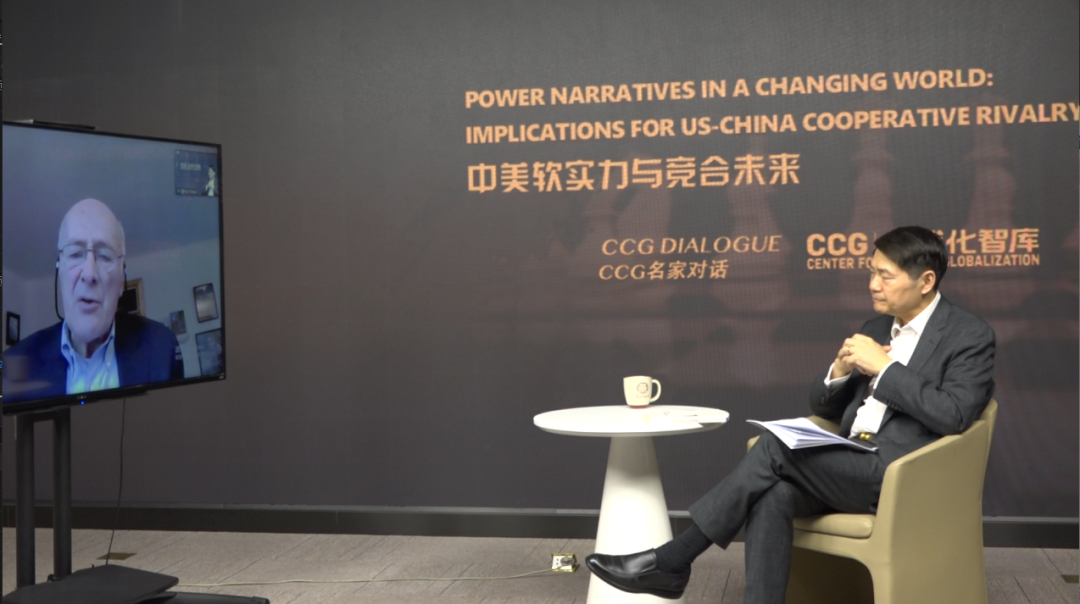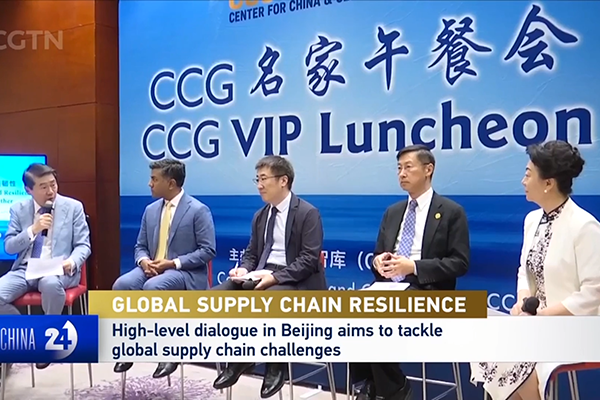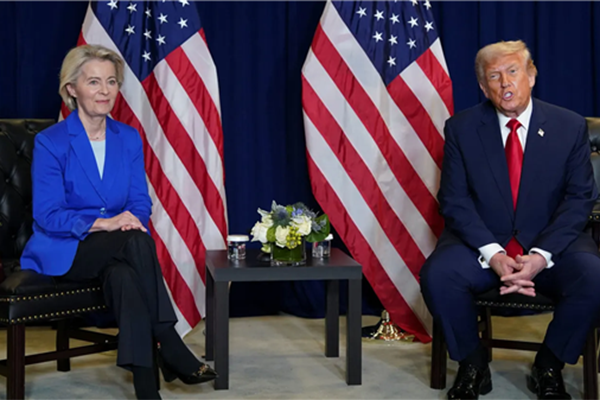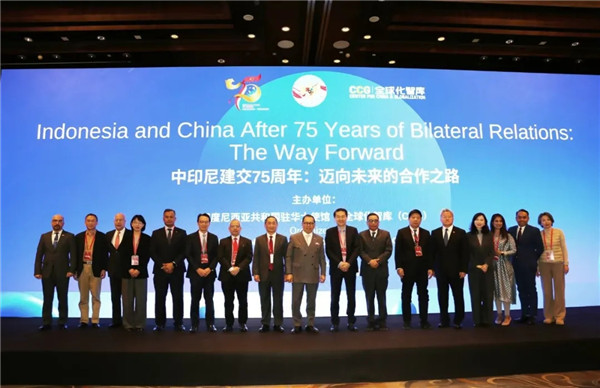【China Daily】China-US cooperation to boost “soft power”
June 03 , 2021In the 1990s, the famous concept of “soft power” was put forward by Joseph Nye, professor and former dean of the Kennedy School of Government at Harvard University. It greatly influenced the foreign policy of the Obama administration and became an important concept promoted by the State Department. In his view, a country’s comprehensive national power is divided into hard power and soft power, which mainly includes “cultural attraction, political value attraction and the ability to shape international rules and decide political issues”.

On April 28, the Centre for China and Globalization (CCG) hosted a CCG distinguished dialogue. Wang Huiyao, president of CCG, hosted a dialogue with Professor Joseph Nye on the central idea of “soft power”, and how China can improve “soft power” as well as the trend of China-US relations in the coming decade.
China-US cooperation to boost “soft power”

Former Dean of the Kennedy School of Government at Harvard University, Joseph Nye
Joseph Nye explains the meaning of soft power as the ability to influence others through attraction rather than coercion or payment. He first developed this idea in 1989 and 1990 when there was a widespread belief that America was in decline. Nye disagreed with this view because he thinks that the power of a country should not only be measured by its military or economic capacity but also by its ability to attract, and that is when the concept of soft power first took shape. Nye believes that American soft power goes up and down all the time and Trump’s populist nationalism and his attitudes in general have led to a considerable loss of American soft power during the four years of his presidency. This is evident from public opinion polls like the Pew poll or Gallup Poll. Nye is confident that American soft power will recover under President Biden since he has already reversed some of Trump’s most unpopular policies, such as the withdrawal from the Paris Climate Accords or withdrawal from the World Health Organization. Additionally, Nye believes that Biden’s less nativist, nationalist attitudes will also make the United States more attractive to other countries. “But it does not indicate American is in decline,” says Nye. He thinks the constant and cyclical beliefs of American decline fail to appreciate the ability of the Americans to be resilient, to regenerate themselves. For instance, the United States was extremely unpopular around the world in the 1960s because of the Vietnam War, but its soft power was soon restored by the 1970s and 80s. Therefore, although America has had a bad four years under Trump, Nye doesn’t’t regard it as a sign of American decline. Finally, Nye said he thinks it’s more typical of the cycles that they have gone through in the past, and he expects that “America will probably recover from this one, as we have from others in the past.”
Nye does not see soft power as a zero-sum game as attraction could go both ways, a country does not have to become more attractive at the cost of the attraction of another country. Soft power is a positive-sum since it can be mutually beneficial in some instances, although this is not always the case. Hence, it is important for the US and China to find areas where they could cooperate. Cooperation, especially on the production of global public goods, could increase the attractiveness of both countries and systems in the eyes of other countries. Most countries do not wish to make the difficult choice of picking a side between China and the US.
In Nye’s view, China and the US do not pose an existential threat to each other, therefore competition between the two countries should be limited and is not “a matter of life and death”. Consequently, although there is nothing the US could do to prevent the rise of China, the Thucydides’s Trap is not emerging. What the US could do is try not to over-exaggerate the threat of China and create unnecessary panic domestically. Competition is healthy because it could incentivize domestic reforms in the US, for instance, the China’s lead in high-speed railways has encouraged the construction of infrastructure in the US. Nonetheless, competition can also be destructive if we are obsessed with fear. Further, we should also be cautious with the language we use. Nye thinks the labeling of the current Sino-US relations as a “New Cold War” is a misinterpretation of history and an exaggeration of the US-China rivalry. In contrast to the relations between the US and the USSR, the US-China relationship is currently highly interdependent with a huge two-way flow of people and goods. Prior to the pandemic, more than three million Chinese tourists visited the US and three hundred thousand students study in the US each year. Therefore, Nye criticizes the use of the metaphors like a “New Cold War” since they are not necessarily accurate descriptions of the current period of history.
We need to integrate the internal narrative with the international narrative

Wang Huiyao, President of the Centre for China and Globalization (CCG)
Wang Huiyao thinks soft power is sometimes interpreted differently in different contexts, but with China’s population of 1.4 billion, the measurement of soft power is a gradual process. Taken into account China’s 5,000-year history and collectivist society, perhaps people are willing to sacrifice a little more personal freedom for the collective good. The spirit of Chinese solidarity helped people to handle the pandemic, hence China has done relatively well at containing the spread of the coronavirus. In addition, China’s soft power could also be reflected in the large number of Chinese students who study in the US. China hopes that more American students will be able to study in China. Before the outbreak, there were also more than 3 million Chinese citizens who traveled to the United States every year. China has a history of 5,000 years, Confucianism, and there are also some new ideas on the horizon. As President Xi Jinping has said, green waters and green mountains are mountains of gold and silver, these beliefs are gradually gain popularity among the public. Wang Huiyao believes, if the US and China can work together to fight this pandemic, we may have a more organized world.
Wang Huiyao suggests, if the US and China could build a mechanism of cooperation and competition, the areas in which they cooperate and compete could both set a standard for the times. The US and China are trying to find each other’s attractions. Thus, although the US and China have some convergence on issues such as the containment of the pandemic and climate change, there are also some conflicts, but in general, cooperation will certainly increase each other’s soft power.
President Biden announced a two-trillion dollar plan to rebuild infrastructure in the US. China has been building “super infrastructure” in the past four decades – China now possesses two-thirds of the world’s high-speed railway networks, seven out of the ten of the largest container ports, and world’s longest bridge, etc. The Asian Infrastructure Investment Bank (AIIB) is a great example of success. Except for the US and Japan, almost all western countries including Australia and Canada take part in the AIIB. Wang Huiyao suggests perhaps China could also invite the US and Japan to be part of the AIIB, to upgrade it into a world infrastructure investment bank so that we can help developing countries. And maybe the US, China, and others can cooperate more.
Wang Huiyao said China and the US are two of the largest countries in the post-war international system built by America. China has benefited from this system and is actively trying to integrate itself into this system. There are still enormous areas where the two countries could work together. Therefore, both countries should avoid exporting their domestic tensions and keep the competition peaceful. “We really need to make the internal narrative into an international narrative, maybe by combining it as well,” Wang said. China and the US are both trying to contain the rise of populism domestically, and that is one area where they could cooperate.
The rise of populism in America is partly caused by the widening gap between rich and poor and racial differences. China had also been facing similar pressures in the last several decades. China is trying to close the gap by lifting 800 billion people out of extreme poverty so that globalization and the opening-up of China won’t generate so much populism and dissatisfaction. Wang Huiyao suggests that this is a lesson that can be learned by both countries and it is now necessary to enable the non-governmental, non-profit organizations to work together for inclusive and balanced globalization, particularly in developing countries. Lastly, it’s also important that the US and China work together on the challenges of Covid-19 in developing countries.
From China Daily, 2021-6-3






